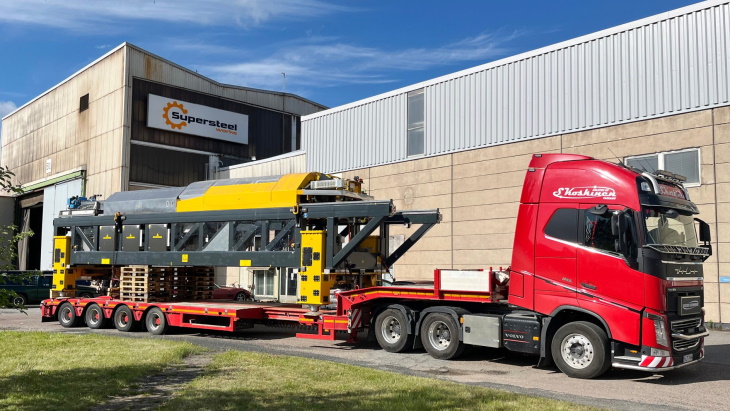
At the Onkalo repository near the Olkiluoto nuclear power plant, used fuel will be placed in the bedrock, at a depth of about 450 metres. The disposal system consists of a tightly sealed iron-copper canister, a bentonite buffer enclosing the canister, a tunnel backfilling material made of swellable clay, the seal structures of the tunnels and premises, and the enclosing rock.
Finnish radioactive waste management company Posiva Oy said it has been developing the buffer installation system (BIS) for several years. It consists of several devices: an installation device, a transfer device and a transport container.
The transfer device transports the bentonite blocks and granule from the container to the installation device in the disposal tunnel, which ensures that there is a bentonite filling between the capsule and the rock.
The transfer device was designed by Comatec and the installation device by Etteplan. The installation and transfer device were manufactured by Supersteel in Parkano. Comatec has also designed the transport container and it was manufactured by IS Works.
Factory tests of the BIS system's installation and transfer equipment were successfully completed in Parkano in early June, Posiva announced. The tests showed that the system works manually.
The approximately 14-metre-long devices have now been transported by two special transports to the Pori testing station, where the automation of the system and its connection to the disposal facility's control system will be implemented. At Pori's testing station, there is a simulation environment where the remote operation of the BIS system can be tested.
"BIS installation and transfer devices move on top of autonomous guided vehicles platforms," explained Eero Väisänen, Posiva's equipment integration project manager. "The devices navigate the disposal facilities independently and have plenty of technology enabling remote operation and automation, such as machine vision, laser sensors and cameras. The devices are autonomous due to the radiation hazard and occupational safety. Building automation and remote operation systems naturally requires a lot of expertise and testing."
When the implementation of the automation at the Pori testing station has been successfully completed, the BIS system will be transferred to Onkalo.
In the repository, bentonite will isolate the disposal capsules from the surrounding rock. It swells when it gets wet, prevents the movement of water around the capsule and acts as a buffer if there is movement in the rock over a long period of time. The bentonite filling around the capsule is part of the multi-barrier principle of used nuclear fuel disposal. Each capsule will be surrounded by more than 20,000 kilograms of bentonite.
The site for Posiva's repository at Eurajoki, near the Olkiluoto nuclear power plant, was selected in 2000. The Finnish parliament approved the decision-in-principle on the repository project the following year. Posiva - jointly owned by Finnish nuclear utilities Fortum and TVO - submitted its construction licence application to the Ministry of Employment and the Economy in December 2013. Posiva studied the rock at Olkiluoto and prepared its licence application using results from the Onkalo underground laboratory, which would be expanded to form the basis of the repository. The government granted a construction licence for the project in November 2015 and construction work on the repository started a year later. The repository is expected to begin operations in the mid-2020s.